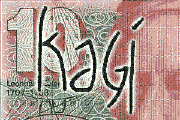

Register changes non-US ASCII characters into US ASCII characters.
Yes, the Register programs convert non-standard ASCII characters into the lower boring US standard ASCII range.Without going into a massive lecture about how computers around the globe store text characters, the simple explanation is that mail systems around the world know how to transmit the standard characters that have no accent marks (ASCII 0 to 127). When you try to send a character with an accent mark, various mail systems around the world react differently.
Some convert the character into some other character (and the character they convert it to will be different in different parts of the world).
Some convert the character into a generic box character that says, there is a character here and I don't know what it is but I've put this place holder here so that you know there was a character here but the actual character is gone.
Some interpret the character as an abort character and the entire email message cannot be sent through the internet.
And some interpret the character as an end of message character and everything that follows that character in the message is chopped off.
And sometimes if you are lucky, the character gets transmitted accurately through to us.
This becomes a big problem when we are using the name (with the accented character) to calculate a registration code. When a mail system substitutes the letter for another and we calculate on the substituted letter (since that's what we received) and you try to use the registration code, it won't work because your name as you type it and your name as we received it were different, they do not match.
SO, the various Register programs convert accented characters into a character in the lower ASCII character set so that it will travel through any email system without being altered. It's not pretty and it alters your name but at least when you pay for something, the registration code we supply you with will work when you enter the text for your name that we said that we used.
Modification Date: Wednesday, August 7, 1996